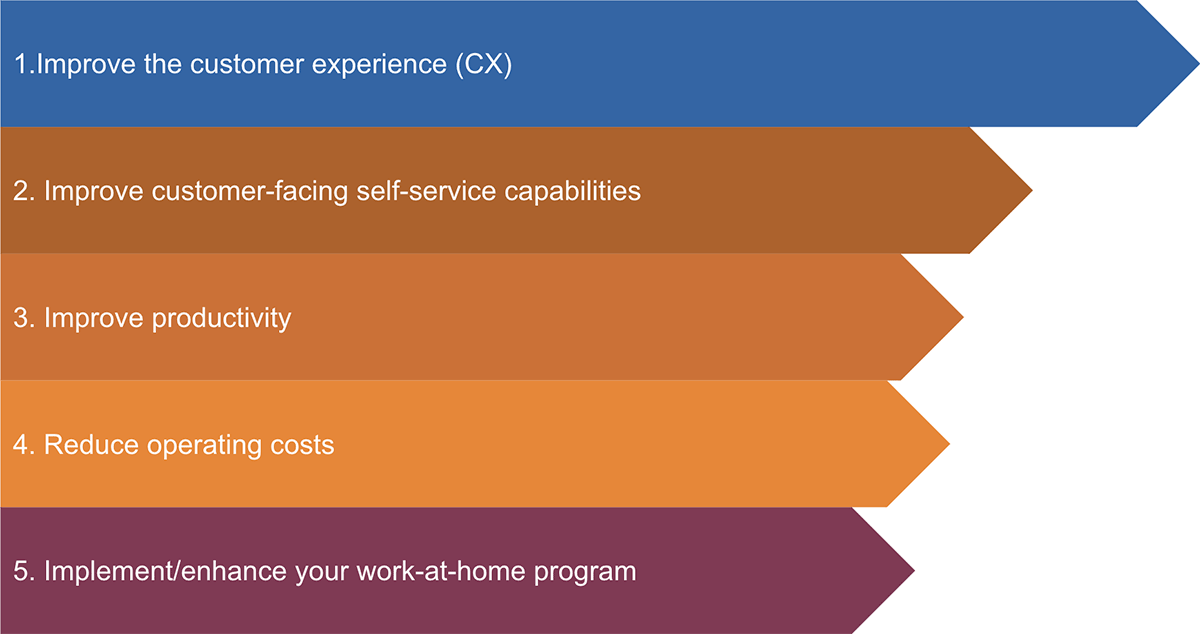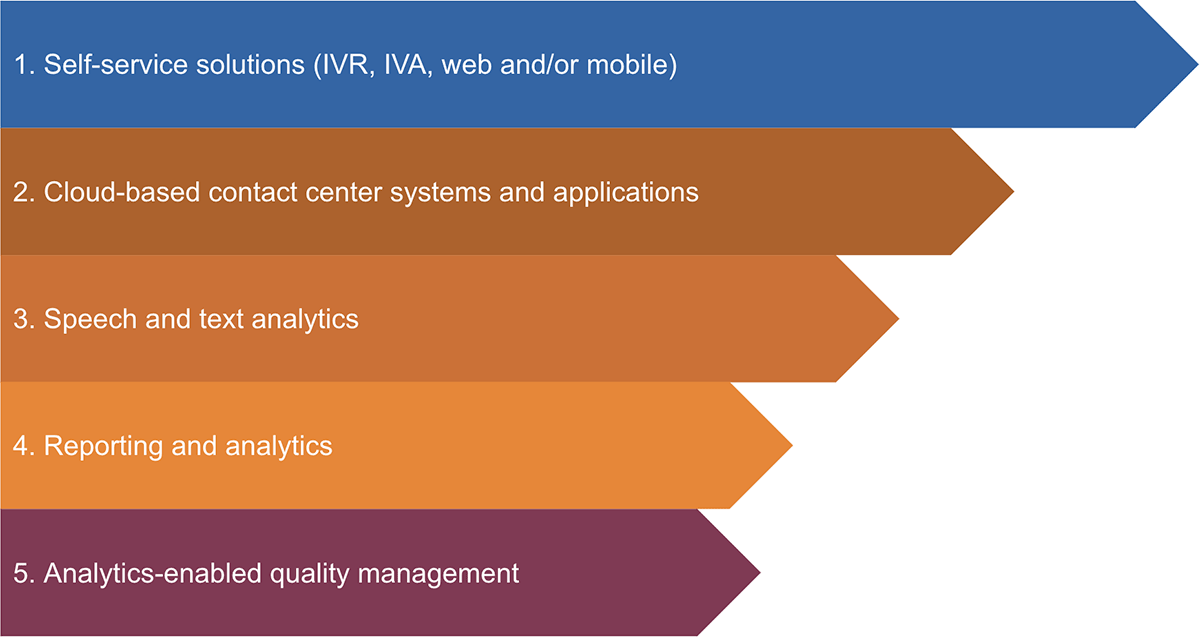2021: The Year of the Contact Center
2021 is off to a rocky start as countries struggle to roll out the vaccines needed to combat the COVID-19 pandemic. Human ingenuity will triumph over adversity and ineptitude. If scientists around the world could develop a series of vaccines for a previously unknown virus in less than 9 months, governments should be able to figure out how to distribute and administer it efficiently, though this is a complex logistics and distribution challenge for which there are proven solutions.
The world has changed in the past year, in many cases for the better, and so must businesses and their service organizations. Contact centers all over the world were forced to accelerate their digital transformation the moment the lockdown hit, as the alternative was not an option. Everything that could go virtual did, and the businesses that had this option were the lucky ones, unlike some of their peers in the entertainment and retail world.
Contact centers around the world have positioned themselves to come out of the pandemic stronger than they went in. These departments and their leaders and employees have displayed courage and grace under fire, acting as the first responders for their companies. When no one else was available to help customers, contact center staff was there to respond to inquiries, using whatever means they had available in their home-based workspaces. The digital transformation happened seemingly overnight in many contact centers when their employees were sent home to work. The cloud carried the day in many companies, demonstrating its agility, flexibility and reliability under great duress.
The question is what the next stage will be for contact centers. Are they going to revert to what they were prior to the pandemic or build on the amazing foundation of change that occurred in record time during the last year, even if it was long overdue? This is exactly what DMG asked enterprise, IT and contact centers leaders from around the world in our annual contact center goals and priority survey, conducted in November and December 2020. We expected insightful responses, and the results did not disappoint. DMG asked executives three brief questions, as we were concerned that the mood amid the challenges of the coronavirus was not appropriate for lengthy surveys, and we were pleased when they responded. The three questions were:
- What are your top contact center priorities for 2021? (Select all that apply)
- What are your top technology priorities for 2021? (Select all that apply)
- After the pandemic is over, are you going to have some/all contact center/customer service employees work from home?
Figure 1 shows the top five answers selected for the first question about top contact center priorities for 2021. 65.8% of survey respondents indicated the importance of prioritizing the customer experience. They made the point, as they have in prior years that everything else should be addressed within this framework. Based on the next few answers, it’s clear that enterprises and their contact center leadership are eager to move forward with initiatives in which they hesitated to invest in prior years. The second-ranked response was to improve customer-facing self-service capabilities, as reflected by 44.7% of respondents. Improving productivity came in third with 36% of the responses, and reducing operating costs came in fourth, as reflected by 34.2% of respondents. These three initiatives are highly interrelated and involve major changes and investments throughout the enterprise. Companies are transitioning from their interactive voice response (IVR) systems to next-gen conversational intelligent virtual agents (IVAs). What makes this change so compelling is that it is happening in many channels and touchpoints throughout the enterprise, not just in the contact center. The fifth-ranked contact center priority for 2021 is implementing/enhancing the work-at-home program, which does not come as a surprise; 29.8% of survey respondents selected this initiative as a priority for 2021. As importantly, when DMG directly asked survey respondents if they were going to have some/all contact center/customer service employees work from home after the pandemic was over, an overwhelming 86% of them said yes.
Figure 1: Top 5 Contact Center Priorities for 2021

Figure 2 displays the top 5 answers for the second question about top technology priorities for 2021. Not surprisingly, self-service solutions (IVR, IVA, web and/or mobile) was the top response, as reflected by 51.8% of respondents. Self-service was slowly becoming the customer channel of choice before the pandemic, and adoption of these solutions was accelerated during the past year, as self-service proved to be the fastest and most convenient channel in which to receive responses, when the solutions were well designed and delivered.
The second-place category, receiving 39.5% of responses, was cloud-based contact center systems and applications. Given the major contributions of the cloud in enabling contact centers during the pandemic, the momentum of companies transitioning to this deployment/financing model is expected to continue. The cloud is being viewed as an essential enabler of contact center digital transformation.
Speech and text analytics (also known as interaction analytics, IA), came in third place, receiving 35.1% of the responses. Interaction analytics has been one of the unsung heroes of the pandemic. Its ability to structure and find insights and customer needs and wants in spoken and text-based conversations made it instrumental in helping executives be responsive to their customers when there was no other way of obtaining this data. Adoption of IA will pick up momentum in contact centers and is expected to see greater adoption throughout enterprises.
Reporting and analytics, which garnered 28.1% of survey responses, has shown up in the top 10 list of contact center technology investments for all of the years that DMG has done this study. Contact center leaders continue to look for more effective reporting tools, to improve their ability to perform their job and improve contact center operations.
The fifth-place investment priority, analytics-enabled quality management (AQM), was cited in 27.2% of the responses. Analytics-enabled QM is an application of IA, so on a combined basis, these two items received a striking 62.3% of the responses. DMG expects companies to adopt AQM as a phase in their digital transformation, as it is a powerful and highly effective tool for keeping track of what agents are doing, how well they are adhering to internal policies and procedures, as well as if they are properly addressing customers (soft skills).
Figure 2: Top 5 Contact Center Technology Priorities for 2021

Final Thoughts
You’ve made it through 2020, and 2021 is expected to be a much better year. The tough times are not fully behind us, but the world is on the path to recovery. Contact centers have been instrumental in helping companies endure through the worst of the times and are again making major contributions by helping organizations schedule and manage the roll-out of vaccinations. Due to their agility and responsiveness, contact centers are coming out of the pandemic with more respect than they went in, positioning these essential customer-facing departments to play an increasingly important role in corporations in the future. (Click here to see the complete survey of contact center and technology priorities for 2021.)
